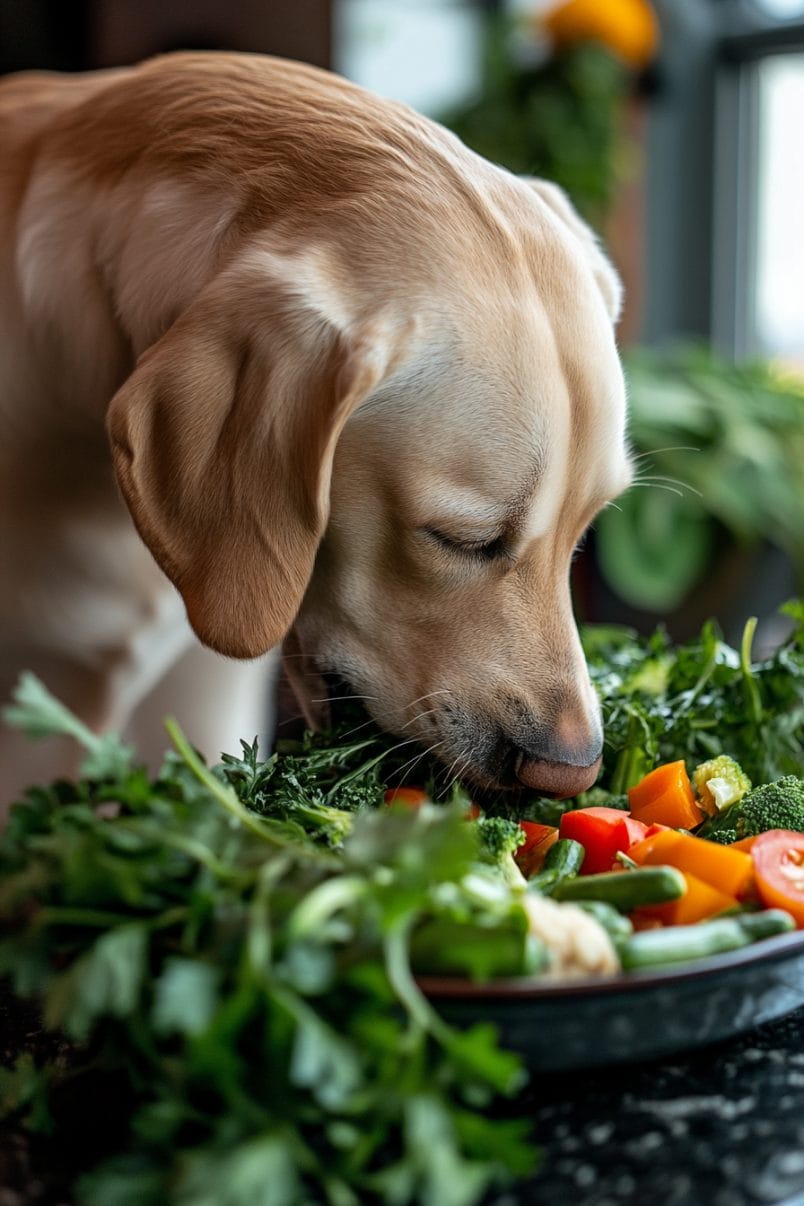
As plant-based diets become increasingly popular among humans, some pet owners wonder if their dogs could or should go vegan too.
But is a vegan diet suitable for dogs?
While some believe it aligns with their ethical beliefs, others are concerned about whether dogs can thrive on a plant-based diet.
In this article, we’ll explore canine nutrition basics, the challenges of creating a balanced vegan diet for dogs, and the potential benefits and risks.
We’ll also dive into case studies and research to help you make an informed decision about your dog’s diet.
Canine Nutrition Basics
Dogs are classified as omnivores, meaning they can eat both meat and plant-based foods.
However, their close ancestry with wolves, who are primarily meat-eaters, means their bodies are especially good at digesting animal proteins.
These proteins provide important nutrients like taurine, vitamin B12, and omega-3 fatty acids, all vital for your dog’s health.
A balanced dog diet includes proteins, fats, carbohydrates, vitamins, and minerals, with most nutrients coming from animal-based sources.
Proteins help build muscles and tissues, fats provide energy and support skin health, and carbohydrates, while not essential, offer energy and fiber for better digestion.

Challenges of Creating a Balanced Vegan Diet for Dogs
Feeding a dog a vegan diet is much more complicated than just giving them plant-based foods.
Dogs have specific nutritional requirements, many of which are found predominantly in animal products.
Meeting these needs with only plants is difficult and requires careful planning.
Here are the key challenges:
Taurine deficiency
Taurine is an amino acid essential for heart health, and it’s mostly found in meat.
Without enough taurine, dogs can develop serious heart problems, like dilated cardiomyopathy (DCM), which has been linked to grain- and plant-based diets.
Vitamin B12 deficiency
Vitamin B12 is crucial for a dog’s nervous system and the production of red blood cells.
This vitamin is only naturally available in animal products, so vegan diets often lack it unless it’s added through supplements.
Protein quality
While plant foods like peas, lentils, and quinoa contain protein, they don’t provide all the essential amino acids that dogs need.
Animal proteins are “complete” proteins, meaning they contain the full range of amino acids that dogs require, while plant proteins often don’t.
Digestibility
Dogs are biologically designed to digest animal proteins more efficiently.
Plant-based diets may be harder on their digestive systems, leading to issues like bloating, diarrhea, or other gastrointestinal problems.
Nutritional balance
Creating a fully balanced vegan diet that meets all of a dog’s nutritional needs takes extensive knowledge and effort.
Essential nutrients, such as omega-3 fatty acids, iron, zinc, and calcium, are often more bioavailable in animal products, and it can be challenging to ensure a dog is getting enough from plant sources alone.

Benefits and Risks of a Vegan Diet for Dogs
Potential benefits
Allergy management
Some dogs are allergic to common animal proteins like beef or chicken, which can cause symptoms like itching, digestive upset, or skin irritation.
By switching to a vegan diet that removes these animal proteins, some dogs may experience relief from their allergies.
Weight control
Vegan diets tend to be lower in calories and fat compared to meat-based diets.
For dogs struggling with weight issues, a well-managed vegan diet might help them shed extra pounds and stay healthy.
Ethical and environmental considerations
For pet owners who are vegan themselves, or who choose a plant-based lifestyle due to concerns about animal welfare or the environment, putting their dog on a vegan diet can align with their values.
This can offer peace of mind and a sense of consistency in their ethical choices.
Potential risks
Nutritional deficiencies
Dogs have specific nutrient needs, like taurine (for heart health) and vitamin B12 (for brain and blood health), which are mostly found in meat.
Vegan diets, without careful planning and supplementation, often don’t provide enough of these critical nutrients.
Deficiencies can lead to serious health problems, like heart disease or neurological issues.
Digestive issues
Dogs have a digestive system designed to process animal proteins efficiently.
A plant-based diet might be harder for them to digest, possibly leading to issues like bloating, gas, or diarrhea.
Long-term health risks
If a vegan diet isn’t properly planned, it can lead to more serious, long-term health problems.
This could include muscle loss, a weakened immune system, or reduced bone strength.
Some studies suggest that feeding dogs a vegan diet over a long period might even shorten their lifespan if their nutrient needs aren’t fully met.

Case Studies and Research
To understand how vegan diets impact dogs, let’s look at some case studies and research findings.
Success stories
There are reports of dogs thriving on vegan diets, particularly when carefully planned and supplemented.
For example, a study conducted by Dodd et al. (2021) followed a group of dogs fed vegan diets and found that they could maintain healthy weight and energy levels comparable to dogs on traditional diets, provided they received the right nutrients and supplementation.
Challenges encountered
However, not all stories are positive.
A case study published in the Journal of Veterinary Medicine reported a dog developing heart disease due to taurine deficiency while on a vegan diet.
The owner, unaware of the need for taurine supplementation, believed that a plant-based diet was naturally healthier for the pet.
It took months of treatment and a return to an animal-based diet for the dog’s health to stabilize.
Research
A review published in the Journal of Animal Physiology and Animal Nutrition looked at different studies and found that while dogs can survive on a vegan diet if it’s properly supplemented, it comes with risks and requires a lot of careful planning.
On the other hand, feeding dogs high-quality animal proteins is usually a simpler and more natural way to make sure they get all the essential nutrients they need.

Final Thoughts
While it’s possible for dogs to follow a vegan diet, it’s crucial to acknowledge the risks and challenges.
If you’re considering transitioning your dog to a vegan diet, consult with a veterinary nutritionist to create a balanced meal plan and use the necessary supplements.
Monitoring your dog’s health through regular vet visits and blood tests will also help identify any deficiencies early.
For many pet owners, the effort and expense of ensuring a balanced vegan diet may not be feasible, making a mixed or animal-based diet a more practical choice.
- Does Cat Litter Melt Ice? The Complete Guide to Winter Safety - January 30, 2026
- Happy Tail Dogs: Understanding This Common Canine Condition - January 29, 2026
- How Cold Can Outdoor Cats Handle? Feline Winter Safety - January 27, 2026


GIPHY App Key not set. Please check settings